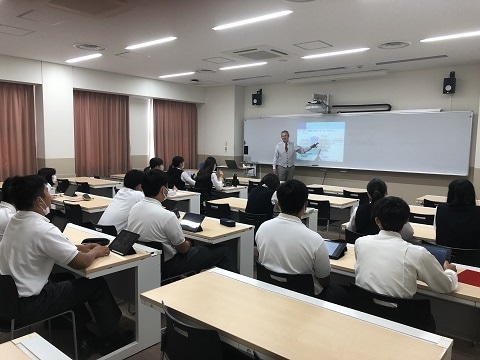- TOP
- Jean Monnet Activities
- Jean Monnet Chair (Agreement No. 2018・3245 / 004 – 001)
- EVENTS Jean Monnet Chair
- 26th May 2022 Lecture at Kwansei Gakuin High school
[ Editor: Institute for Industrial Research 30th September, 2022 ]
26th May 2022 Lecture on EU at Kwansei Gakuin Senior High School
Lecture Title:“Challenges the EU Faces in the 21st Century”
Date & Time: 26th May, 2022 1:20 p.m. – 3:00 p.m.
Place: Kwansei Gakuin Senior High School
Lecturer: Holger Bungsche, Professor, School of International Studies, KGU
Number of participants: 22
Purpose:
The purpose of the class was to make high school students aware of the characteristics of European integration. On the one hand the EU of course pursues an own agenda, on the other hand it always has had to react to developments and challenges that are beyond the sphere of influence of the EU itself.
With this respect the lecture aimed at, first, making the students understand, that for the EU the establishment of the single market and the single currency, has been absolutely vital and essential for being able to react towards outside challenges, because both, the single market and the single currency, are providing the EU with the political and economic power to act as a global player. And, secondly, the goal of the lecture was to make students realize that at the heart of the single economic and monetary area are the four freedoms (free movement of goods, capital, services and people).
As examples of the challenges the EU faces the lecture addressed (1) the war in Ukraine and the energy supply crisis, as well as (2) the dispute with the UK in respect to the Northern Ireland Protocol.
Description:
The lecture presented the integration process of Europe as a development in three stages. The first stage was the reconciliation period until the mid-1950s, where institutional structures for consolidating trade like the European Payments Union, for post-war reconstruction (Marshall Plan) and for a common industrial base (ECSC) were created. In the second phase between the mid-1950s to the end of the 1980s common institutions and common policies were established like for instance the EC administration, common agricultural, fishing, environmental policies, the European Monetary System etc. In a third stage between the early 1990s and the early 2000s then market and monetary integration was achieved. This provided the EU finally with the basis, at least economically, to act as a global player. Secondly, having thus explained the fundamentals of the evolution of European integration the lecture then proceeded to the challenges the EU has been facing in the first two decades of the 21st century.
First, there has been the challenge of international competitiveness, which the EU approached by formulating the Lisbon and the New Lisbon Strategies. Both strategies were rather catch-up oriented strategies to close the gap in economic and employment development compared with the USA. With the Gothenburg Strategy the EU added for the first time an environmental component to the economic growth strategies, shifting the focus to sustainable development and green technologies as a chance to become a world center of new environmentally friendly technological innovation. A next decisive step was the Europe 2020 strategy that in addition to the economic, innovation and renewable energy goals put the focus also on improving education levels and fighting poverty. This led up to the formulation of the European Green Deal, the first development strategy that decouples economic development from energy and natural resources consumption. With the “Fit for 55” and regulations covering all contributors of green-house gas emissions, including provisions for international trade, the EU is not just reacting towards global climate change, but pushing forward with the agenda to achieve sustainable economic, environmental and social development.
Finally, the lecture briefly addressed two challenges the EU is facing at the moment, first, the crisis of the war in Ukraine and its impact to make the EU independent from fossil energies, and, secondly, the attempt of the UK to hollow out the Northern Ireland Protocol that threatens to undermine the integrity of the EU internal market.
Reaction of the Students to the Lecture:
One high school student commented: “Brexit was unfair to the young people of Britain, because they are deprived of their rights to study and work were they wanted”, while another said, she was surprised to learn that the regional development and income discrepancies within member states of the EU are larger than the discrepancies between member states.



